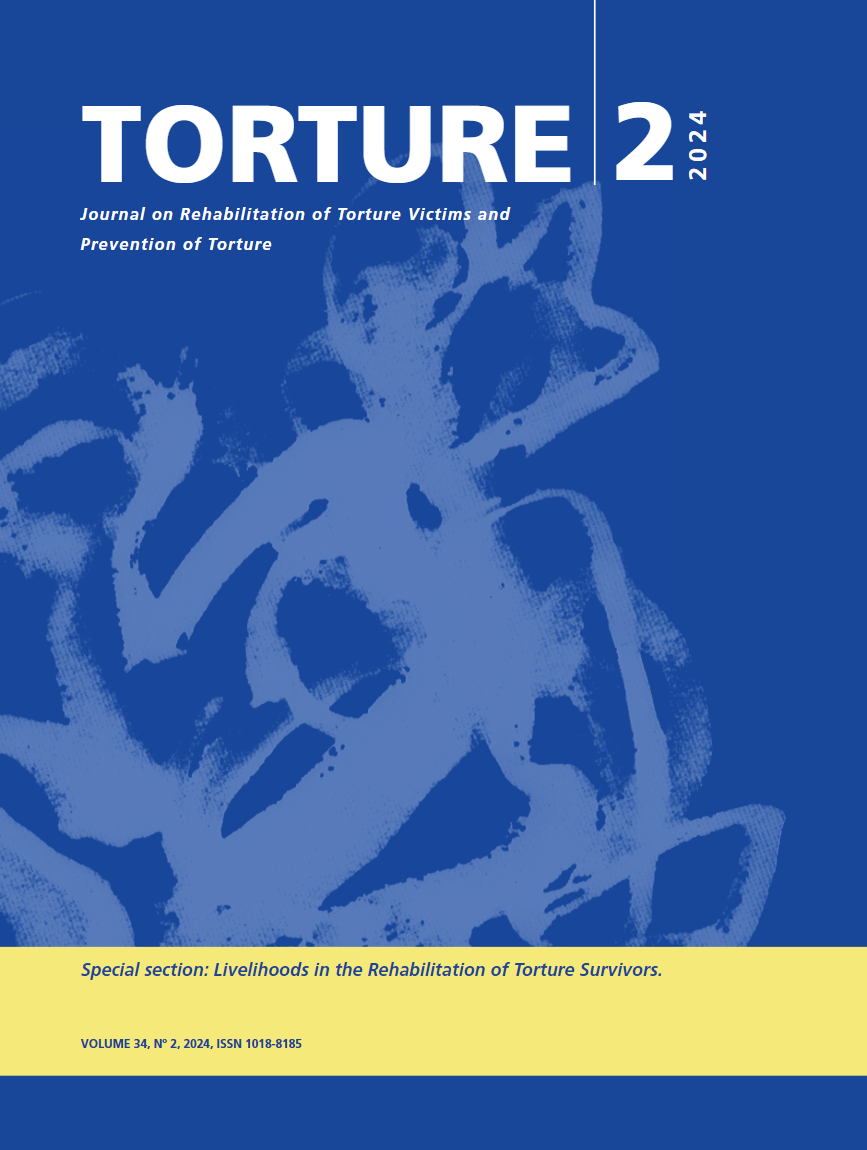Integration of livelihood support with MHPSS in rehabilitation of torture survivors in LMICs
Addressing poverty and mental health dynamics
DOI:
https://doi.org/10.7146/torture.v34i2.146559Keywords:
Integration of livelihood support, mental health and psychosocial support, rehabilitation, torture survivors, economicAbstract
Introduction: The integration of livelihood support with mental health and psychosocial support (MHPSS) is crucial for the rehabilitation of torture survivors in low- and middle-income countries (LMICs). This study aimed to explore the intersectionality of poverty and mental health, and the integration of livelihood support within MHPSS frameworks within the rehabilitation settlements of torture survivors in LMICs. Method: A cross-sectional study was conducted using a semi-structured questionnaire distributed to members of the International Rehabilitation Council for Torture Victims (IRCT) in LMICs. The questionnaire was designed to gather data on the extent to which poverty contributes to poor mental health outcomes among torture survivors and the effectiveness of integrating livelihood support into MHPSS interventions. Results: The study found that 92% of respondents believed that poverty and mental health outcomes of torture survivors are strongly linked. Economic and social inequalities were identified as key determinants of mental disorders in the country, emphasizing the need to address these inequalities in rehabilitation programs for torture survivors. The study also highlighted the significant economic challenges faced by torture survivors, indicating a high prevalence of extreme poverty among this group. Discussion: The study underscores the critical connection between poverty, mental health, and the experience of torture, emphasizing the need for comprehensive support. The integration of livelihood support with MHPSS is essential for addressing economic disparities and promoting long-term resilience among survivors. The study recommends enhancing coordination among stakeholders, addressing cultural and social barriers, securing sustainable funding, and developing strategies to overcome anticipated challenges or barriers in integrating livelihood support with MHPSS for torture survivors in LMICs. By addressing the diverse needs of torture survivors, including economic empowerment, mental health support, and social integration, this integrated model can contribute to holistic recovery, long-term resilience, and overall well-being.References
Amnesty International. (2023, March 27). Amnesty International Report 2022/23: The state of the world’s human rights. Amnesty International. https://www.amnesty.org/en/documents/pol10/5670/2023/en/
Einolf, C., Wyatt, S., & Márquez, C. A. (2023). Best practices in survivor engagement in IRCT member centres. Torture. 2023; (33): 45-62. https://doi.org/10.7146/torture.v33i2.135818
Flamand, B. (n.d.). Healing. IRCT. Retrieved March 8, 2024, from https://irct.org/healing/
Hassan, G., Ventevogel, P., Jefee-Bahloul, H., Barkil-Oteo, A., & Kirmayer, L. J. (2016). Mental health and psychosocial wellbeing of Syrians affected by armed conflict. Epidemiology and Psychiatric Sciences, 25(2), 129–141. https://doi.org/10.1017/s2045796016000044
IFRCT. (n.d.). Food security and livelihoods | Homepage | IFRC. Retrieved November 19, 2023, from https://www.ifrc.org/our-work/disasters-climate-and-crises/food-security-and-livelihoods
Inter-Agency Standing Committee (IASC) Guidelines on Mental Health and Psychosocial Support in Emergency Settings. (2007). Geneva: IASC.
IOM Iraq. (2021). Needs Assessment: Integrating MHPSS and Livelihood Support in... | IOM Iraq. Retrieved November 19, 2023, from https://iraq.iom.int/resources/needs-assessment-integrating-mhpss-and-livelihood-support-iraq
Islam, T., & Ryan, J. (2016). Chapter 4—Mitigation in the Private Sector. In T. Islam & J. Ryan (Eds.), Hazard Mitigation in Emergency Management (pp. 101–124). Butterworth-Heinemann. https://doi.org/10.1016/B978-0-12-420134-7.00004-7
Knifton, L., & Inglis, G. (2020). Poverty and mental health: policy, practice and research implications. B J Psych bulletin, 44(5), 193–196. https://doi.org/10.1192/bjb.2020.78
Kohrt, B. A., Mistry, A. S., Anand, N., Beecroft, B., & Nuwayhid, I. (2019). Health research in humanitarian crises: an urgent global imperative. BMJ global health, 4(6), e001870. https://doi.org/10.1136/bmjgh-2019-001870
Kumar, S., & Willman, A. (2016). Healing invisible wounds and rebuilding livelihoods: Emerging lessons for combining livelihood and psychosocial support in fragile and conflict-affected settings. Journal of Public Health Policy, 37 Suppl 1, 32–50. https://doi.org/10.1057/s41271-016-0009-0
Lund, C., De Silva, M., Plagerson, S., Cooper, S., Chisholm, D., Das, J., Knapp, M., & Patel, V. (2011). Poverty and mental disorders: breaking the cycle in low-income and middle-income countries. Lancet (London, England), 378(9801), 1502–1514. https://doi.org/10.1016/S0140-6736(11)60754-X
McVeigh, K. H., Galea, S., Thorpe, L. E., Maulsby, C., Henning, K., & Sederer, L. I. (2006). The epidemiology of nonspecific psychological distress in New York City, 2002 and 2003. Journal of urban health : bulletin of the New York Academy of Medicine, 83(3), 394–405. https://doi.org/10.1007/s11524-006-9049-2
Moore, A., van Loenhout, J. A. F., de Almeida, M. M., Smith, P., & Guha-Sapir, D. (2020). Measuring mental health burden in humanitarian settings: a critical review of assessment tools. Global health action, 13(1), 1783957. https://doi.org/10.1080/16549716.2020.1783957
Nemiro, A., Jones, T., Tulloch, O., & Snider, L. (2022). Advancing and translating knowledge: a systematic inquiry into the 2010-2020 mental health and psychosocial support intervention research evidence base. Global mental health (Cambridge, England), 9, 133–145. https://doi.org/10.1017/gmh.2022.6
Philipp, J. (2023, June 25). The Problem of Mental Health in Pakistan - The Borgen Project. The Borgen Project; https://www.facebook.com/borgenproject. https://borgenproject.org/the-problem-of-mental-health-in-pakistan/
Schafer, A., Masoud, H., & Sammour, R. (2014). Mediation of daily stressors on mental health within a conflict context. Intervention, 12 (2), 171-186. doi: 10.1097/WTF.0000000000000031.
Tol, W. A., Barbui, C., Galappatti, A., Silove, D., Betancourt, T. S., Souza, R., Golaz, A., & van Ommeren, M. (2011). Mental health and psychosocial support in humanitarian settings: linking practice and research. Lancet (London, England), 378(9802), 1581–1591. https://doi.org/10.1016/S0140-6736(11)61094-5
United Nations High Commissioner for Refugees. (2015). Culture, Context and the Mental Health and Psychosocial Wellbeing of Syrians: A Review for Mental Health and Psychosocial Support staff working with Syrians Affected by Armed Conflict. UNHCR. Retrieved June 21, 2024, from https://www.unhcr.org/media/culture-context-and-mental-health-and-psychosocial-wellbeing-syrians-review-mental-health-and
United Nations. (1984). Convention against Torture and Other Cruel, Inhuman or Degrading Treatment or Punishment. OHCHR. https://www.ohchr.org/en/instruments-mechanisms/instruments/convention-against-torture-and-other-cruel-inhuman-or-degrading#:~:text=For%20the%20purposes%20of%20this

Downloads
Published
How to Cite
Issue
Section
License
Copyright (c) 2024 Torture Journal

This work is licensed under a Creative Commons Attribution-NonCommercial-NoDerivatives 4.0 International License.
We accept that some authors (e.g. government employees in some countries) are unable to transfer copyright. The Creative Commons Licence Attribution-NonCommercial-NoDerivatives 4.0 International (CC BY-NC-ND 4.0) covers both the Torture Journal and the IRCT web site. The publisher will not put any limitation on the personal freedom of the author to use material contained in the paper in other works which may be published, provided that acknowledgement is made to the original place of publication.

